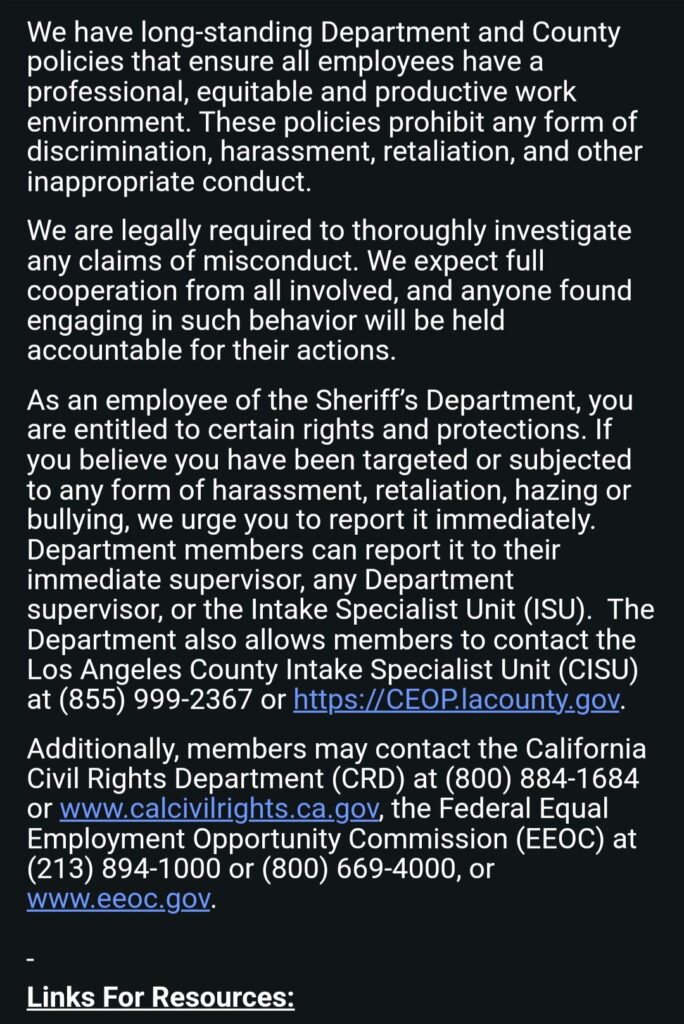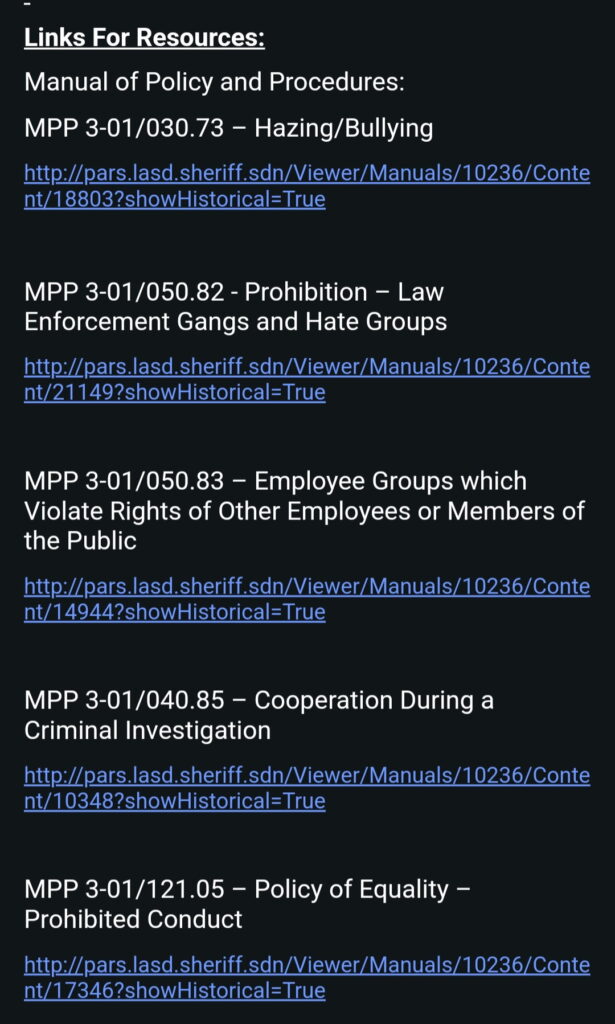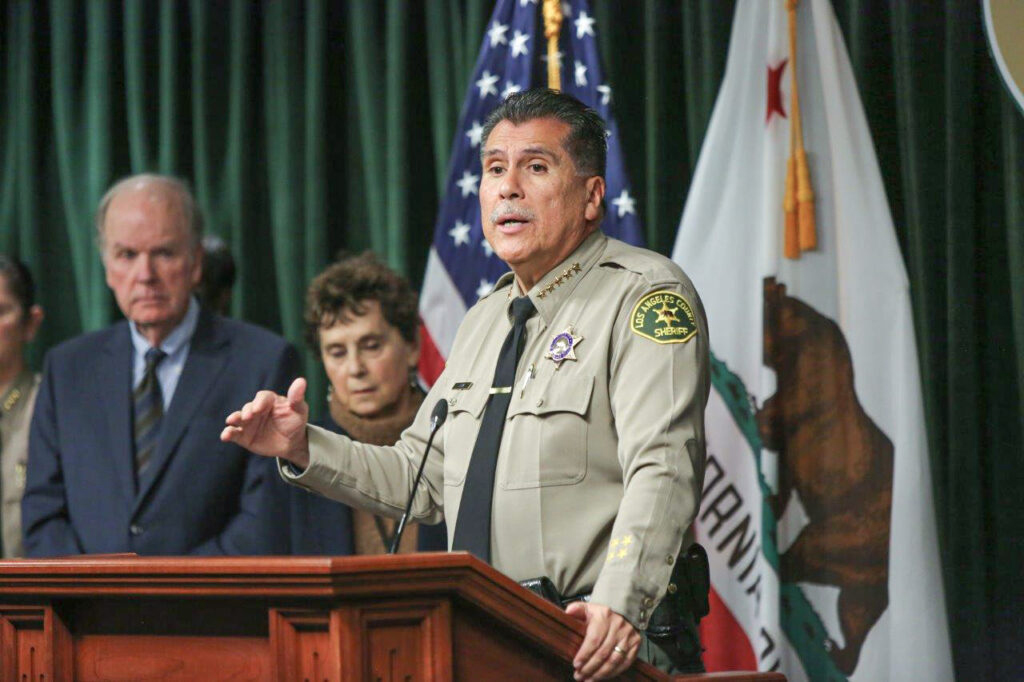On March 5, 2025, at 1:22 PM, Los Angeles County Sheriff Robert Luna issued a department-wide memo warning against harassment and retaliation, particularly in relation to an “upcoming running competition.” While he avoids naming the event, it’s clear he’s referring to the Baker to Vegas (B2V) relay race—a long-standing tradition within law enforcement circles.
The memo states that several personnel have reported being targeted with harassment, retaliation, and bullying over their decision to either participate or abstain from the event.
Luna insists that such behavior is unacceptable and goes against LASD’s core values. However, many within the department see the memo as a heavy-handed response that further erodes trust in leadership.
A DEPARTMENT DIVIDED
The controversy surrounding B2V is just the latest in a series of internal rifts within LASD. Many deputies feel betrayed by leadership, particularly over what they see as the department’s role in fast-tracking Deputy Trevor Kirk’s case to federal authorities – resulting in what many feel was a wrongful conviction for civil rights abuse under the color of authority.
In response, numerous LASD teams have chosen to boycott B2V in silent protest. Whether they feel it’s an act of solidarity or self-preservation, the boycott has created tension within the department, leading some to feel pressured into taking sides.
Luna’s memo does little to clarify the situation – instead, it raises more questions than answers. Who exactly is being targeted? Those still planning to run, or those choosing to sit out? And if the memo was meant to de-escalate tensions, why does it read like a veiled threat?




THE “DEPUTY GANG” IMPLICATION
One of the most alarming aspects of the memo is its inclusion of department policies related to law enforcement gangs and hate groups. By citing these policies alongside those on harassment and retaliation, Luna appears to suggest that those abstaining from B2V – or encouraging others to do so – could be viewed as engaging in prohibited group behavior.
This raises serious concerns.
Is boycotting a race now considered gang activity?
Could deputies choosing not to participate face investigations or disciplinary action?
And most importantly—is Luna using policy as a weapon to silence dissent?
If LASD leadership is now equating solidarity among deputies with participation in deputy gangs, it signals a disturbing shift in departmental culture – one where loyalty is mandated, and questioning authority comes at a cost.
WHO’S THE REAL BULLY?
Luna’s memo frames harassment and retaliation as a department-wide issue, but it fails to acknowledge the role leadership has played in fostering a culture of distrust.
If LASD personnel feel so unheard that they’ve organized a department-wide boycott, then the real problem isn’t the race – it’s the leadership. By issuing this memo, Luna may have intended to restore order, but instead, he’s likely deepened the divide. His response feels less like protecting deputies from harassment and more like policing their choices.
Retired LASD Captain Mike Bornman, a 36 year veteran of the department gave us his insight on the boycott:
“It is no secret that deputies remain rightfully concerned about the legal nightmare that fellow Deputy Trevor Kirk has been subjected to. Many believe that Luna had a firm hand in ensuring that this case was taken up by members of the Joe Biden Federal Bureau of Investigation and US Attorney’s office. Their concerns are valid and need to be addressed more fully.
As a display of unity, many LASD running teams have voluntarily joined in a planned boycott of the upcoming Baker to Vegas relay race that is held every Spring in Las Vegas.
One of the results? According to the email, some personnel are reportedly feeling as though they are being, “targeted with actions of harassment, threats of retaliation, and bullying.” Based on the language of the email, it’s not clear if it’s targeting those teams still willing to participate, or against those that have chosen to stay home in silent protest. Either way, if this is in fact the case, it is unprofessional and inappropriate and needs to stop immediately.
What I take issue with is the overall heavy-handed response as noted in the body of the email. At the end of it, a number of policy sections are listed as somehow being relevant to the issue. This includes the “Prohibition of Law Enforcement Gangs and Hate Groups.”
Think about it; you want to stand in unity with your fellow deputies who are feeling ignored, demeaned, dismissed, and treated like second class citizens in their own department. You organize a silent protest and by doing so, you are suddenly accused of participating in a Deputy Gang or Hate Group and threatened (bullied) with an investigation. It seems that simply by encouraging others to join in the protest, you have suddenly become a gang and/or hate group member.”
Bornman’s insight underscores a much deeper issue: Luna’s leadership isn’t just failing to unite LASD – it’s actively alienating its personnel. The Baker to Vegas boycott isn’t the problem; it’s a symptom of a department-wide breakdown in trust, morale, and leadership accountability.
Rather than addressing the root cause of deputies’ frustrations – the belief that their leadership is selective in its enforcement of justice and loyalty – Luna’s memo doubles down on control, intimidation, and bureaucratic overreach.
With LASD already under scrutiny for its internal culture, this memo could escalate tensions rather than resolve them. Will there be disciplinary actions against those participating in the boycott? Will Luna’s leadership continue to alienate his own deputies? And most importantly – will the department ever regain the trust of those who feel abandoned by it?
Instead of treating dissent as insubordination, Luna should be engaging with his department, addressing their concerns head-on, and leading with transparency. Otherwise, this B2V boycott will be remembered as more than just a protest, it will be seen as a turning point in the growing divide between LASD’s leadership and the men and women who serve under it.


Follow Us